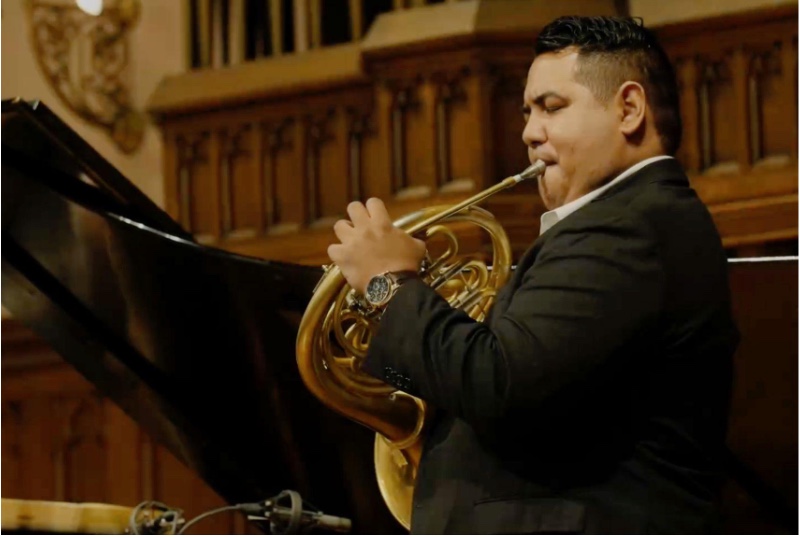by Stephanie Manning

The Friday night program at Harkness Chapel saved the most traditional selection for last: Johannes Brahms’ Piano Trio No. 2 in C. Pianist Roman Rabinovich, violinist Joseph Lin, and cellist Oliver Herbert gave a spirited performance, taking advantage of the Chapel’s tastefully dry acoustic to accentuate moments of uber-quiet playing.
While the Brahms was a safe choice to send the audience off into the weekend, the music before intermission is where things got a little more interesting. University of Akron music theory and composition professor James Wilding spent most of his pre-concert talk dissecting John’s Book of Alleged Dances, and for good reason — John Adams’ devilishly complicated string quartet requires its players to perform with an ever-changing backing track of loops recorded on a prepared piano.
The piece demands extreme attention from the players, who must be exacting and unerring throughout Adams’ carefully tangled brushstrokes. Violinists Alexi Kenney and Diana Cohen, violist Milena Pajaro-van de Stadt, and cellist Annie Jacobs-Perkins rose to the challenge with the requisite determination (and the occasional tempo-tapping feet).
Of the five selections from the ten total movements, the ones without the backing track, like “Alligator Escalator,” can feel a bit unmoored. But the piano’s percussiveness is a welcome addition to movements like “Judah to the Ocean,” which mimics the clattering wheels of its San Francisco streetcar namesake, or “Habanera,” which gave Kenney a chance to show off his playful virtuosity and lovely tone.
Kenney’s bubbly energy was a great match for the quartet, even if it sometimes unsettled his duo pieces: Biber’s Mystery (Rosary) Sonata No. 1, “The Annunciation,” and C.P.E. Bach’s Sonata in g, H. 542.5. Although technically impressive, a few of his blisteringly fast tempos left a little less room for the notes to breathe. Harp was a welcome addition in place of a keyboard, and Bridget Kibbey gamely kept up with the speed while asserting herself as an equal partner. The pair played the works back-to-back without pause, and the connection felt seamless.
Pianist Adam Golka and hornist Nelson Ricardo Yovera Perez made only one appearance this evening, but it was instantly memorable — a thrilling performance of Schumann’s Adagio and Allegro, Op. 70. Perez’s command of his instrument is breathtaking, with crisp double-tonguing and sensitive diminuendos that taper without a trace. Part of ChamberFest’s Rising Star program, Perez is in his second summer with the festival, and he is absolutely one to watch. His promising career is clearly just beginning.
Published on ClevelandClassical.com June 19, 2024.
Click here for a printable copy of this article



